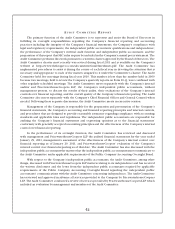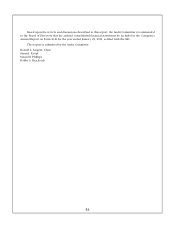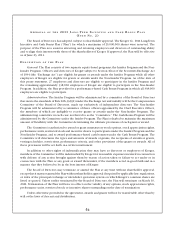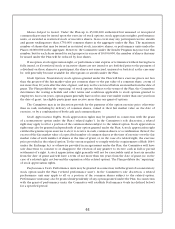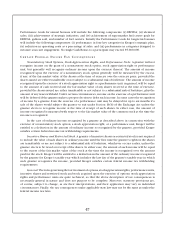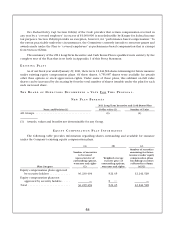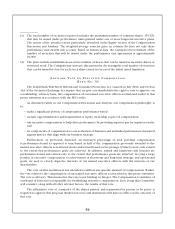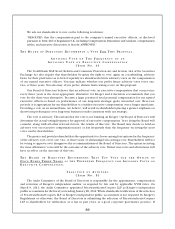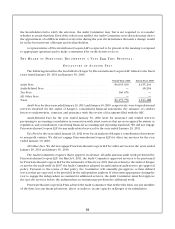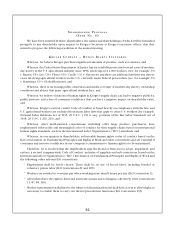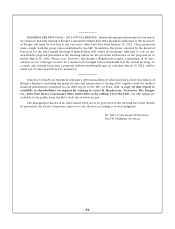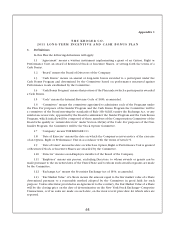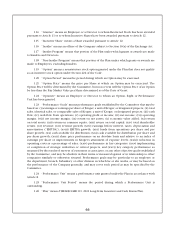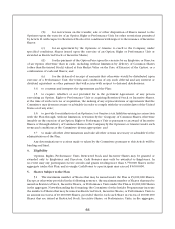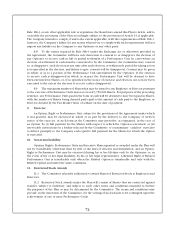Kroger 2010 Annual Report Download - page 64
Download and view the complete annual report
Please find page 64 of the 2010 Kroger annual report below. You can navigate through the pages in the report by either clicking on the pages listed below, or by using the keyword search tool below to find specific information within the annual report.
62
SH A R E H O L D E R PR O P O S A L
(IT E M NO. 6)
We have been notified by three shareholders, the names and shareholdings of which will be furnished
promptly to any shareholder upon request to Kroger’s Secretary at Kroger’s executive offices, that they
intend to propose the following resolution at the annual meeting:
KR O G E R CO M P A N Y – HU M A N RI G H T S ST A N D A R D S
Whereas, we believe Kroger purchases significant amounts of produce, such as tomatoes, and
Whereas, the United States Department of Justice has successfully prosecuted several cases of modern-
day slavery in the U.S. agricultural industry since 1996, involving over 1,000 workers, (see, for example, US
v. Ramos; US v. Lee; US v. Flores; US v. Cuello; U.S. v. Navarrete) and there are additional modern-day slavery
cases involving agricultural workers in the U.S. currently under federal prosecution (see, for example, US
v. Bontemps, US v. Global Horizons), and
Whereas, there is increasing public awareness and media coverage of modern-day slavery, sweatshop
conditions and abuses that many agricultural workers face, and
Whereas, we believe violations of human rights in Kroger’s supply chain can lead to negative publicity,
public protests, and a loss of consumer confidence that can have a negative impact on shareholder value,
and
Whereas, Kroger’s current vendor Code of Conduct is based heavily on compliance with the law, and
U.S. agricultural workers are excluded from many labor laws that apply to other U.S. workers (for example,
National Labor Relations Act of 1935, 29 U.S.C. § 151 et seq.; portions of the Fair Labor Standards Act of
1938, 29 U.S.C. § 201, 213), and
Whereas, other multi-national corporations, including other large produce purchasers, have
implemented enforceable and meaningful codes of conduct for their supply chains based on international
human rights standards, such as the International Labor Organization’s (“ILO”) standards, and
Whereas, in our opinion as shareholders, enforceable human rights codes of conduct based on the
ILO’s Declaration on Fundamental Principles and Rights at Work and other conventions and are essential if
consumer and investor confidence in our company’s commitment to human rights is to be maintained,
Therefore, be it resolved that the shareholders urge the Board of Directors to adopt, implement, and
enforce a revised company-wide Code of Conduct, inclusive of suppliers and sub-contractors, based on the
International Labor Organization’s (“ILO”) Declaration on Fundamental Principles and Rights at Work and
the following other relevant ILO conventions:
* Employment shall be freely chosen. There shall be no use of forced labor, including bonded or
voluntary prison labor (ILO Conventions 29 and 105);
* Workers are entitled to overtime pay when working more than 8 hours per day (ILO Convention 1);
* All workers have the right to form and join trade unions and to bargain collectively. (ILO Conventions
11, 87, 98, 110);
* Worker representatives shall not be the subject of discrimination and shall have access to all workplaces
necessary to enable them to carry out their representation functions (ILO Convention 135).


